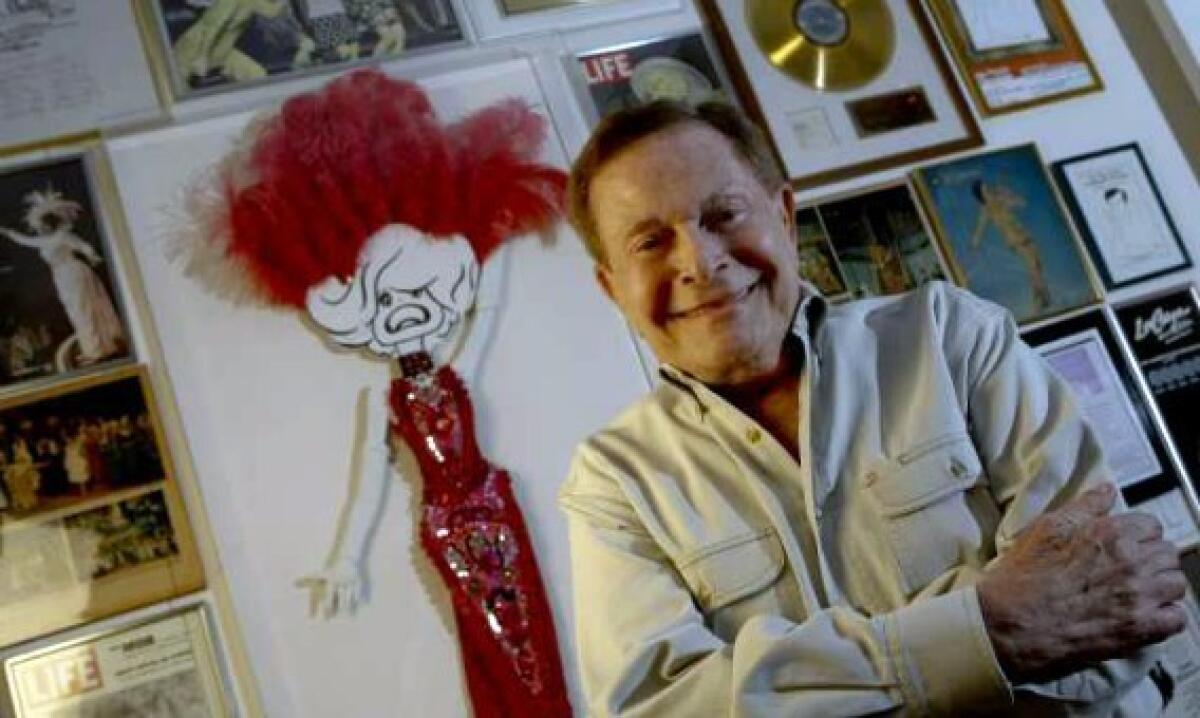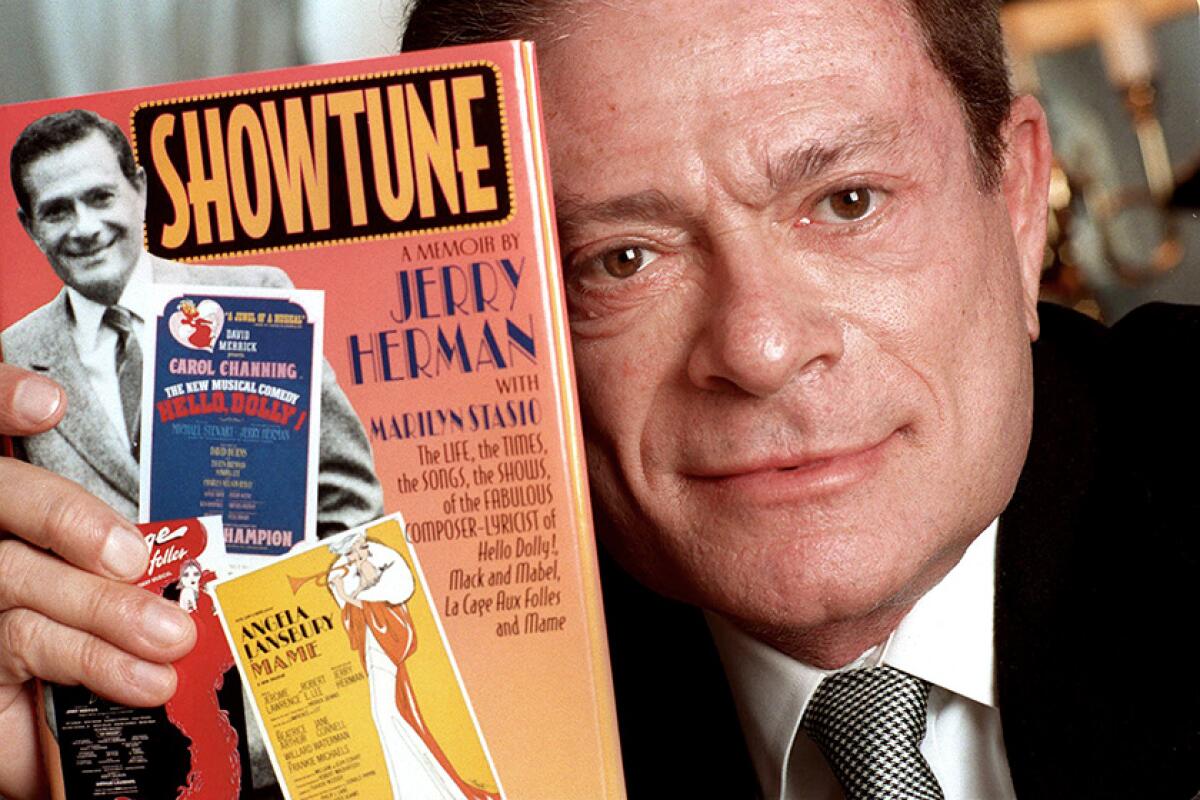Jerry Herman, composer behind âHello, Dolly!â and âLa Cage aux Folles,â dies at 88

Jerry Hermanâs biggest Broadway show didnât start out as âHello, Dolly!â
The musical had not yet made it to Broadway when jazz great Louis Armstrong recorded his own version of one song.
The singerâs gravelly-voiced take on âHello, Dolly!â turned it from the swaying, âGay â90sâ-style tune Herman had envisioned into a phenomenal toe-tapping hit, inspiring the producers to slap its name across the marquee. When it reached Broadway in early 1964, the show stayed there for a record-breaking 2,844 performances.
What had been called âDolly: A Damned Exasperating Womanâ would become the biggest in a string of hits for Herman, the versatile composer and lyricist who also wrote âMameâ and, years later, âLa Cage aux Follesâ in a career that brought him worldwide renown, repeated revivals, and two Tony and two Grammy awards.
Herman died Thursday in Miami. He was 88.
Known for his upbeat, deceptively simple lyrics and catchy tunes, Herman was a wunderkind of a golden era of musical theater on Broadway in the 1960s and 1970s. He wrote songs that celebrated the resilience of the human spirit, centered on such characters as Dolly Levi, the indomitable matchmaker at the heart of âHello, Dolly!â and Mame Dennis, the bohemian aunt who is the central figure in âMame.â
âHis music is emotionally very accessible, a very joyous and positive kind of music, and his shows just captured the pulse of the public at the time,â Miles Kreuger, president of the Institute of the American Musical, said in a 2013 interview.
Although critics sometimes called his music overly light, especially as Broadway tastes turned to more complex themes, Hermanâs biggest hits proved remarkably enduring.
His goal was simple, he said. âWhat I really want,â he told the New York Times in 1998, âis to be an entertainer, to entertain masses of people.â
His work featured showstoppers, such as the title songs of âDollyâ and âMameâ and the defiant âI Am What I Amâ in âLa Cage aux Folles.â He was also known for lyrics that expanded the roles of his larger-than-life female characters. There was a reason for that, some said, and Herman didnât disagree.
âHe wrote for his mother,â âDollyâ star Carol Channing, a close friend, said in a 2008 PBS documentary, âWords and Music by Jerry Herman.â âHeâs written the most marvelous womenâs parts for musicals that anyone ever wrote, because he wrote them for someone he loved dearly.â

Gerald Sheldon Herman, an only child, was born in New York City on July 10, 1931, and grew up in Jersey City, N.J. His mother, the former Ruth Sachs, taught piano and had a music radio program. His father, Harry Herman, taught physical education and with his wife ran a summer camp that became a musical training ground for their son.
After he learned to play piano at 5, the family often spent evenings playing show tunes, with Harry on saxophone and Ruth on accordion. They took in many Broadway shows but one, when he was about 14, hit young Jerry like a jolt of electricity. It was âAnnie Get Your Gun,â featuring the powerful voice of Ethel Merman.
He began writing music, thinking of it as a hobby. But Ruth Herman, urging her skeptical son to âwaste a half hour of your life,â arranged for him to meet Broadway icon Frank Loesser, composer and lyricist of âGuys and Dolls.â
Improbably, Loesser encouraged the young man, saying he thought he could be a success with his music. âIt was like a door opening; it really started everything moving in my life,â Herman told The Times in 1992.
He studied theater at the University of Miami, earning a bachelorâs degree in 1953. The next year, using songs heâd written in college, he staged his first off-Broadway revue, âI Feel Wonderful.â
His first modest Broadway success, in 1961, was âMilk and Honey,â a musical about American widows touring the young state of Israel. It ran for 543 performances.
He was soon summoned to a meeting with renowned Broadway producer David Merrick, who needed a composer and lyricist for a musical based on âThe Matchmaker,â a Thornton Wilder play. Herman was hired for what would become âHello, Dolly!â after delivering four songs to Merrick three days later, including the popular âPut On Your Sunday Clothes.â
When it opened on Broadway in 1964, âHello, Dolly!â was a sensation, running for seven years and winning 10 Tony awards, including for composer and lyricist for Herman, who also won a Grammy for the title song. Other stars, including Pearl Bailey, followed Channing in her signature role. In 1969, Barbra Streisand starred in an Oscar-winning film version.
Next for Herman was âMameâ in 1966, which starred Angela Lansbury as the irrepressible title character who takes in her brotherâs orphaned son. Based on the novel âAuntie Mameâ by Patrick Dennis, the show was a smash, winning three Tonys, and running for more than 1,500 performances. A cast recording brought him a Grammy for original score.
Other Broadway productions followed: âDear Worldâ in 1969, âMack and Mabelâ -- which Herman often called his favorite -- in 1974 and âThe Grand Tourâ in 1979, but all were commercial flops.
âLa Cage aux Follesâ put him back on top. Based on a French film comedy, the 1983 musical was a humorous but touching love story with a gay couple and transvestism at its heart. Hermanâs songs were credited with helping mainstream audiences care about the gay characters, a daring notion at the time.
Playing against a backdrop of the growing AIDS crisis, his song âI Am What I Am,â sung by one character after a painful, passing rejection by his partnerâs son, became an anthem of gay pride.
The show won six Tonys, including original score for Herman, and played for more than four years. With its success, he became the first composer-lyricist to score more than 1,500 performances each for his three major hits.
But AIDS, which decimated the supporting cast of âLa Cage aux Folles,â would directly touch the life of Herman, who was openly gay. In the late 1980s, he was diagnosed with HIV and lost his longtime partner Martin Finkelstein to AIDS.
Although he was treated with medications that kept the infection from progressing, Herman stopped writing for Broadway. He was shaken, he wrote in his 1996 memoir, âShowtune,â by the death of his lover, his own illness and a feeling that despite âLa Cage,â his music was no longer in fashion.
In later years, he wrote the score for a 1996 TV musical, âMrs. Santa Claus,â took part in revues of his music and checked on revivals of his many shows. In 2010, he was honored at the Kennedy Center.
Reflecting at one point on the sweep of his life, he spoke of it in terms familiar for the man who wrote âBefore the Parade Passes Byâ for âHello, Dolly!â
âItâs a very long, colorful parade,â he told the Washington Post in 2010. âWith lots of balloons. And banners. And confetti. And all of that. But itâs also kind of near the end of it. Thatâs very moving and very rewarding.â
Trounson is a former Times staff writer.
More to Read
Start your day right
Sign up for Essential California for the L.A. Times biggest news, features and recommendations in your inbox six days a week.
You may occasionally receive promotional content from the Los Angeles Times.






